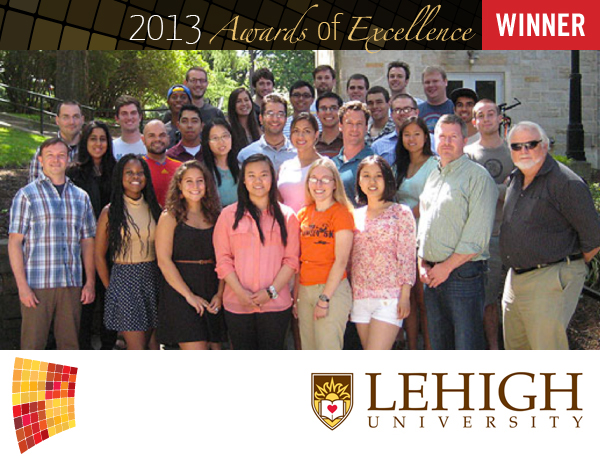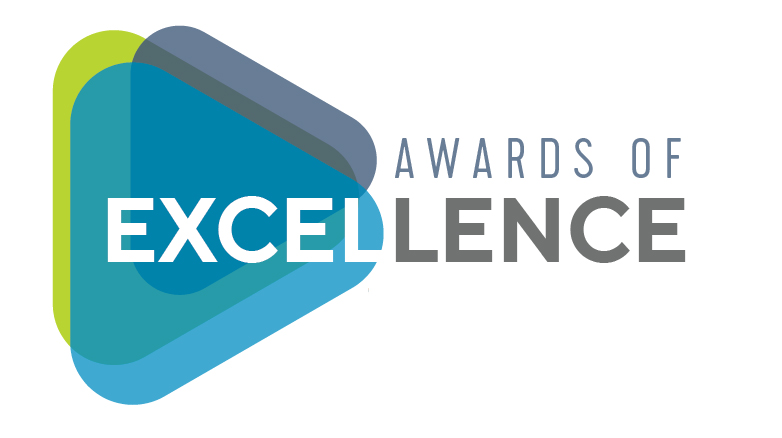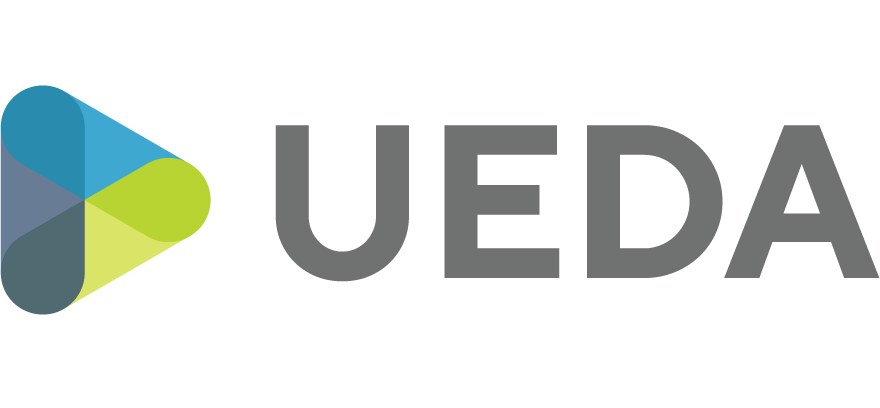Network

| Award Category: | Talent Development |
| Project Site: | Master’s of Engineering in Technical Entrepreneurship (MTE) |
| Submitted By: | Lehigh University |
| Contact: | John Ochs, 610.758.4593 |
Case Study
Abstract
In the 20 year history of innovation and entrepreneurship, in addition to helping may local companies, Lehigh University’s Integrated Product Development (IPD) program (www.lehigh.edu/ipd/) has being the launching pad for several notable successful student startups (http://ecotechmarine.com/). In the spring of 2012, Lehigh faculty launched our unique Master of Engineering in Technical Entrepreneurship (MTE) with the sole purpose of creating successful student startups. This new graduate program is open to entrepreneurially-minded students from any undergraduate major. Lehigh’s MTE program features a dedicated curriculum, a dedicated faculty, and dedicated creative spaces, all focused on helping student entrepreneurs create, refine, and commercialize intellectual property through licensing and launching of a new business. In fact new product development and company launch are graduation requirements. The MTE program is the latest addition to Lehigh’s University’s award winning entrepreneurship ecosystem that is designed to attract, and support student entrepreneurs. On May 20, 2013 Lehigh’s graduated its first class of 14 entrepreneurs that created 12 new products and launched 10 new businesses. The very next day, the 28 members of the MTE class of 2014 started their journey into creativity, innovation and entrepreneurship. The ten year goal of Lehigh’s MTE program is to graduate 90 student entrepreneurs and launch 50 new companies each year and in the process become a major source of economic development for the Lehigh Valley, the Commonwealth of Pennsylvania and the USA. As we like to say, “Don’t take a job, come to Lehigh to create your own!”
Problem/Background
Economic development’s primary focus is the creation of new jobs. According to the 2010 report by the Kauffman Foundation, startups are the leading creators of new jobs in the U.S. The question is how do we create more successful startups?
As is well known, startups are fragile with few surviving more than a several months. We firmly believe that we can improve the number of successful startups by both increasing the number of people who try and increasing their odds for success.
A large untapped source of potential startups comes from undergraduate and graduate entrepreneurs who have the knowledge, creativity and mindset to bring their ideas for products and services to a world market. Many universities have invested heavily in developing the entrepreneurial ecosystem to support faculty-led research commercialization of funded research. At Lehigh, these resources are now being extended to student-led entrepreneurial startups. Over the past 10 years at Lehigh University the number of successful student-led startups that have survived for at least one year has averaged about two per year but these have had a significant impact on the local economy. (See UEDA’s 2010 Award to EcoTech Marine for Excellence in Technology Commercialization).
In 2010 with the launch of Lehigh’s Baker Institute for Entrepreneurship, Creativity and Innovation, the number of students enrolled in entrepreneurship courses has increased each year to reach more than 3,400 in 2013. As reported to the Baker Foundation, our ultimate goal is to “infect” all 6,500 Lehigh students with the “entrepreneurial mind set.” For 2013 the number of ventures in various phases of launch by current students and faculty has grown to 55. A major contributor to this growth was the 2012 launch of Lehigh’s Master of Engineering in Technical Entrepreneurship.
In a joint effort between the Baker Institute and the P.C. Rossin College of Engineering and Applied Science, the authors launched a one-year, 30-credit multidisciplinary Master of Engineering in Technical Entrepreneurship that provides entrepreneurially minded graduates the culture, environment and resources needed for student-led startups to launch and survive.
Solution
In 2011, Professors John Ochs (Engineering) and Todd Watkins (Business) and a dedicated team of faculty and staff developed a master’s program with the pedagogical assumption that the best way to learn how to be an entrepreneur is to insist that students launch new businesses as a requirement for graduation.
Lehigh’s MTE Program – dedicated space
In 2012 with startup funding from David Wu, the dean of the P.C. Rossin College of Engineering and Applied Science, professors Ochs and Watkins launched Lehigh’s Master of Engineering in Technical Entrepreneurship (MTE), which features a dedicated curriculum taught by a dedicated faculty in a dedicated space, all focused on developing the entrepreneurial mindset through company startup and product launch.
In direct opposition to the trend in MOOC’s, the Master of Engineering in Technical Entrepreneurship is a one-year, 30-credit, full-time, residential program modeled on the “skunk works” model for fostering creativity, innovation and entrepreneurship. Lehigh’s MTE students work in a dedicated and secure studio space designed to help them develop their entrepreneurial mindset through hands-on learning. Alongside this startups studio is a new “maker space” focused on developing student creativity through hands-on building, prototyping and testing.
Lehigh’s MTE Program – dedicated curriculum
The MTE curriculum is offered in a 10-10-10 credit sequence of courses beginning with 10 credits in the summer focused on individual skill building in creativity, visual thinking, prototyping and Intellectual Property (IP). The 10 credits in the fall semester focus on seeking opportunity from customers, developing and securing the IP for the product or service, concept and testing that concept with early adapters and designing a business using the Osterwalder’s business model canvas. For the spring semester’s 10 credits, students are required to launch their company and sell their product or service to real customers.
Lehigh’s MTE Program – dedicated faculty team
A unique feature of the MTE program is the multidisciplinary faculty representing the pillars of new product development and company launch including: design, business, engineering and law. Each member of the MTE faculty brings unique experience in entrepreneurial startups:
Before coming to Lehigh, Marc de Vinck was director of product development at MAKE magazine and a member of the MAKE Technical Advisory board. He has written numerous posts on do-it-yourself science and technology on makezine.com, as well as articles and featured builds in the print version of MAKE. He thrives on the process of making and educating, with one of his greatest career accomplishments the implementation of Maker Faire‘s Learn to Solder program, which taught more than 10,000 people a lifelong skill and hopefully inspired many to realize they are makers. De Vinck’s interests include micro-controllers, open source hardware, interactive art and anything that uses technology in a unique way.
One finds Michael Lehman at the intersection of entrepreneurship, science and higher education. Prior to joining the Lehigh faculty, Lehman developed and grew new entrepreneurship programs at the Institute for Entrepreneurial Excellence, part of the University of Pittsburgh’s Joseph M. Katz Graduate School of Business and College of Business Administration. At Pitt, he served as director of PantherlabWorks, a consulting group designed to catalyze the commercialization of new technologies by supporting innovators and entrepreneurs from a variety of academic backgrounds and professional experiences. As director of student entrepreneurship, he created new academic courses and cross-campus programs to provide hands-on, experiential learning opportunities for undergraduate and graduate students throughout the university.
John B Ochs is the co-founder and director of Lehigh’s Professional Master’s in Technical Entrepreneurship program. Ochs founded and directed Lehigh’s Computer-Aided Design Labs in the Mechanical Engineering and Mechanics Department from 1980 to 1999. From 1985-95 he did extensive industry consulting and was involved in the startup of three companies. From 1999 to the present, he has directed Lehigh’s award-winning Integrated Product Development (IPD) program. What started out in 1994 as the capstone experience for mechanical engineering majors is now a truly multidisciplinary program that is cross-listed in engineering, business and arts with more than 300 students from over 20 majors participating each year. The pilot program for this course won the 1996 American Society of Mechanical Engineers’ curriculum innovation award and the 1997 Newcomen Society’s award for the promotion of America’s free-enterprise system. Ochs joined the Lehigh University mechanical engineering and mechanics faculty in 1979 and became a full professor in 1990. In 2006 Professor Ochs won the NCIIA-Olympus Award for Curriculum Innovation.
In addition to managing Lehigh University’s Wilbur Powerhouse Prototyping Lab and Chandler-Ullmann Wood Shop, Brian Slocum teaches courses in prototyping and metalworking and advises Integrated Product Development teams. Returning to Lehigh (his alma mater ’97) after completing the MFA Design program at North Carolina School of the Arts, Slocum has worked in both Lehigh’s Theatre Department and Design Arts Program. In addition to his work at the university, Slocum co-founded Isosceles Design Studio, LLC, a design firm specializing in custom furniture and architectural and interior design.
Attorney Joe Maenner founded Maenner & Associates, LLC in 2011 after practicing in intellectual property boutique firms and general practice firms, as well as serving as in-house counsel for a small high-technology startup company. He has taken the “best practices” from all of those experiences and has molded them together to produce his firm. In addition, he has eliminated the “billable hour” that clients loathe, and replaced it with a fixed fee that is quoted to and agreed upon by the client prior to each phase of his work. Maenner graduated from the Dickinson School of Law (now part of the Pennsylvania State University) in 1996 and began actively practicing intellectual property law in 1998. His client base has ranged from Fortune 500 companies to large research universities, from small, privately held companies to independent inventors.
Attorney Joshua Cohen has been in the private practice of intellectual property law since 1992, drawing from his engineering and legal background to help emerging companies and multi-national corporations achieve their business objectives. Cohen teams with his clients to develop strategies that protect critical intellectual property assets while identifying and reducing business risks. Cohen earned his Juris Doctor degree, cum laude, from Widener University, where he served as editor in chief of Widener’s Law Review. He also earned a Bachelor of Science in Mechanical Engineering from Lehigh University.
Matt Sommerfield is a principal of MTS Ventures, LLC, which was founded in 2005 to provide comprehensive product design and development services. The focus of the company is to help its clients take their products to a higher level of success through better designs, reduced manufacturing costs and lean product development. Sommerfield has had experience with contract furniture, ergonomic office products, medical products, task lighting, restaurant equipment, sports training equipment and lighting control systems. He received his B.S. in Manufacturing Engineering Technology in May 2000 from Rochester Institute of Technology. The goal of the manufacturing engineering technology program is to prepare individuals for professional employment in the product design, development and manufacturing fields. This program is designed to provide the skills necessary for applying emerging manufacturing technologies. Throughout the academic program, a significant amount of hands‐on laboratory experience in manufacturing is provided as well as a required cooperative education program.
Administrative Support
Todd Watkins is the director of the Lehigh University’s Baker Institute for Entrepreneurship, Creativity and Innovation and director of Lehigh’s Microfinance Program. Prior to his graduate studies, he worked in Optical Design and Optical Manufacturing Engineering for the Eastman Kodak. Author of more than 50 related publications, his research and teaching focus on the intersection of innovation, entrepreneurship, public policy and economics. He is co-editor of the volume Moving Beyond Storytelling: Emerging Research in Microfinance (Emerald, 2009) and has published in the journal Science, and well as Research Policy, Issues in Science and Technology, Technology Review, Defense and Peace Economics, Small Business Economics, and other journals and books. His teaching areas encompass managerial economics, technology entrepreneurship, new product development and microfinance innovation.
Lisa Getzler-Linn is director of administration and programs for Lehigh University’s Baker Institute for Entrepreneurship, Creativity and Innovation. The institute fosters a culture of entrepreneurship across campus and promotes innovative thinking and recognition that entrepreneurial ideas can occur in any field. From 2001 to the present she has served as associate director of Lehigh’s award-winning Integrated Product Development (IPD) program in which business, engineering and arts and sciences students work together to produce and market new products. Getzler-Linn also directs the EUREKA! student entrepreneurship competitions and the Lehigh Entrepreneurs Network.
Jodie Johnson handles logistics and coordination for Lehigh University’s Technical Entrepreneurship Master’s Degree Program and International Undergraduate Workshop, working with the programs’ students and faculty. Jodie brings 20 years of experience at Lehigh University to the position, having worked for Lehigh’s Energy Research Center as publications and administration coordinator and secretary since 1993. She previously worked in several other positions, including as an administrative assistant for Northeast Tier Ben Franklin Technology Center. Jodie has experience with small businesses, as the daughter of small business owners and a former co-owner of her own businesses.
Results
A unique feature of Lehigh’s MTE program is the multi-disciplinary makeup of the student body. While the degree is a Master of Engineering (M.Eng.), students come from not only different engineering majors, but we insist that each cohort be truly multidisciplinary with admissions open to all undergraduate majors.
The first cohort of 15 students started the MTE program in May 2012 with 14 graduating in May 2013. The first cohort included five women and 10 men with five engineering majors, four art , architecture and design majors, and one each from political science, nanotechnology, global studies, journalism, psychology and finance.
Among the first graduating class, as of three months after graduation, 40% (6/15) of the class are actively starting their own businesses, 47% (7/15) took jobs in industry or academia, and 13% (2 /15) did not complete the program or are still looking for employment.
The second cohort of 28 students started in May 2013 and has completed 10 of the 30 credits on their way to graduation in May 2014. In this cohort there are 10 women and 18 men from six different colleges with ages from 22 to 35 and from six states and three countries. For the second cohort, MTE student’s undergraduate majors include management, finance, accounting, German, English, design, architecture, global studies, history, physics, behavioral neuroscience, political science, psychology, bioengineering, materials science and mechanical engineering.
Future Considerations
We anticipate continued growth of the MTE program. We are planning for rolling admissions with three distinct cohorts starting at the beginning of our summer semester (the current model), then the fall and again in spring semesters. Our target total enrollment would be 90 students enrolled in the MTE program at any one time. This growth would require a tripling of the current space and faculty. Fortunately, Lehigh has just secured the two remaining unoccupied former Bethlehem Steel buildings on Lehigh Mountaintop Campus. Internal proposals and external fundraising are under way to make this growth possible.
An immediate consideration is to strengthen Lehigh entrepreneurship infrastructure by giving the graduating MTE students a place to launch their new enterprises. While the university houses the Ben Franklin TechVentures incubator, Lehigh and the Lehigh Valley entrepreneurs need a business accelerator to support startups. Several members of the MTE class of 2013 have applied to accelerators in different locations away from the Lehigh Valley. The next logical step is the development of a Lehigh accelerator to provide former student-led startups with the funding, work and living spaces they need to create new jobs and grow societal wealth.
Finalist Presentation
UEDA Awards of Excellence Finalists presented at the Annual Summit in Pittsburgh on October 28, 2013. Summit attendees then voted for the best initiative in each category.

